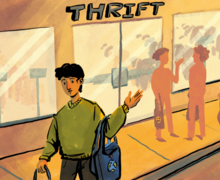Shields: Feminism should advocate for all women
Recently, Elle UK magazine decided to make its mark on the feminist community by dedicating its December issue to the movement. For this issue, Elle UK partnered with the Fawcett Society, the largest women’s advocacy group in Britain, to design a feminist T-shirt with the phrase “This Is What a Feminist Looks Like.”
However, on Nov. 2, The Daily Mail published an article saying that the T-shirts are manufactured in sweatshop conditions in Mauritius, a small island located in the Indian Ocean. It was revealed that these factory workers, most of whom are women, are being paid 62 British pence or $1 an hour and forced to sleep with 16 people to a room. These women are rarely allowed to go home and visit family, have few breaks and often work 12 hour shifts.
Ironically, the people who will wear these T-shirts may be the last thing a feminist looks like. Feminism is supposed to be about the rights and equality of all women but this incident is an example of certain women falling through the cracks. In order for the feminist movement to be effective for all women, all women must be included. In other words, anyone who considers themselves to be a feminist should not wear or support these shirts.
In addition to not wearing these T-shirts, feminists should be more inclusive by advocating for issues that affect women of a lower socioeconomic status. Fighting for improved working conditions, a livable minimum wage and better labor laws in general are more important than wearing a T-shirt that helps to further oppress other women.
Feminism has a longstanding problem of focusing on one demographic while ignoring others. Intersectionality — or the interactions between different forms of oppression — must be addressed in feminist discussion and advocacy. Feminists are not only straight, white, middle-class women; women who are trans*, low-income, disabled or who are people of color need more acknowledgment within feminism.
Without this acknowledgment, entire communities will be ignored, silenced and eventually erased. Women who need the help of feminism will be left to fend for themselves and women who can contribute to feminism won’t have a place to do so.
Emma Watson, along with a number of other A-listers and politicians, has worn the shirt in support of the campaign. When the sweatshop conditions were revealed, Elle UK has stated that they are “liaising with Whistles (the clothing store where the T-shirts were sold) as they look into the newspaper allegations.” Although The Fawcett Society has stated that it takes the allegations “very seriously,” it continues to stand by the T-shirts.
This instance is an example of women being marginalized not only because of their gender but because of their class as well. These women need more than just a few celebrities wearing T-shirts. They need improved labor laws, unionization and proactive buyer behavior. The people wearing these T-shirts should consider that a woman’s class may further subjugate her.
As a group of people who have been marginalized and oppressed, feminists should be especially keen to the plights of others. Ignorance of this issue highlights the problem with representation within the feminist community because it is a prime example of one group of women being given a voice at the expense of another.
Acknowledgment, however, is not enough; it is also important that we allow this situation to fuel us to consider the issues of other marginalized groups. Not only should feminists be fighting for things like better representation in video games and the elimination of Photoshop-use in magazines but also we should also strive for better labor laws and improved buyer behavior.
Mandisa Shields is a sophomore newspaper and online journalism major. Her column appears weekly. She can be reached at meshield@syr.edu and followed on Twitter @mandisashields.
Published on November 13, 2014 at 12:01 am





